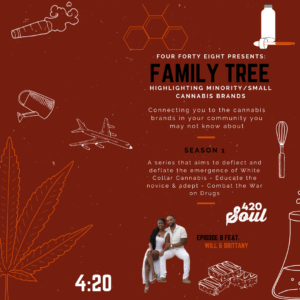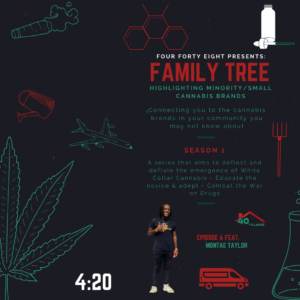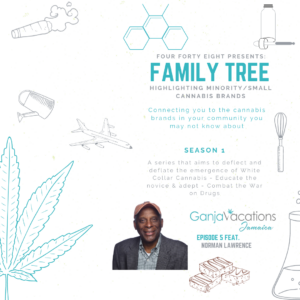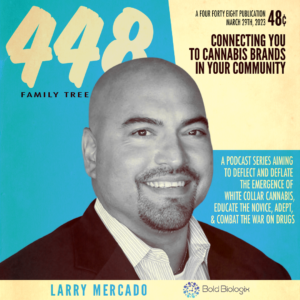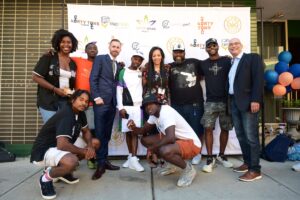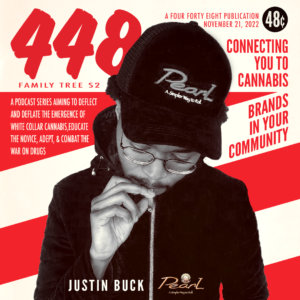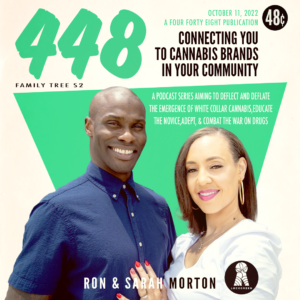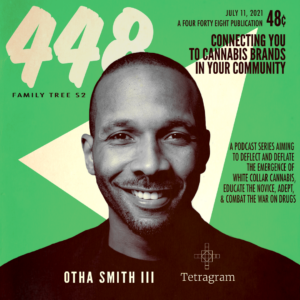Family Tree: Hala Hemp
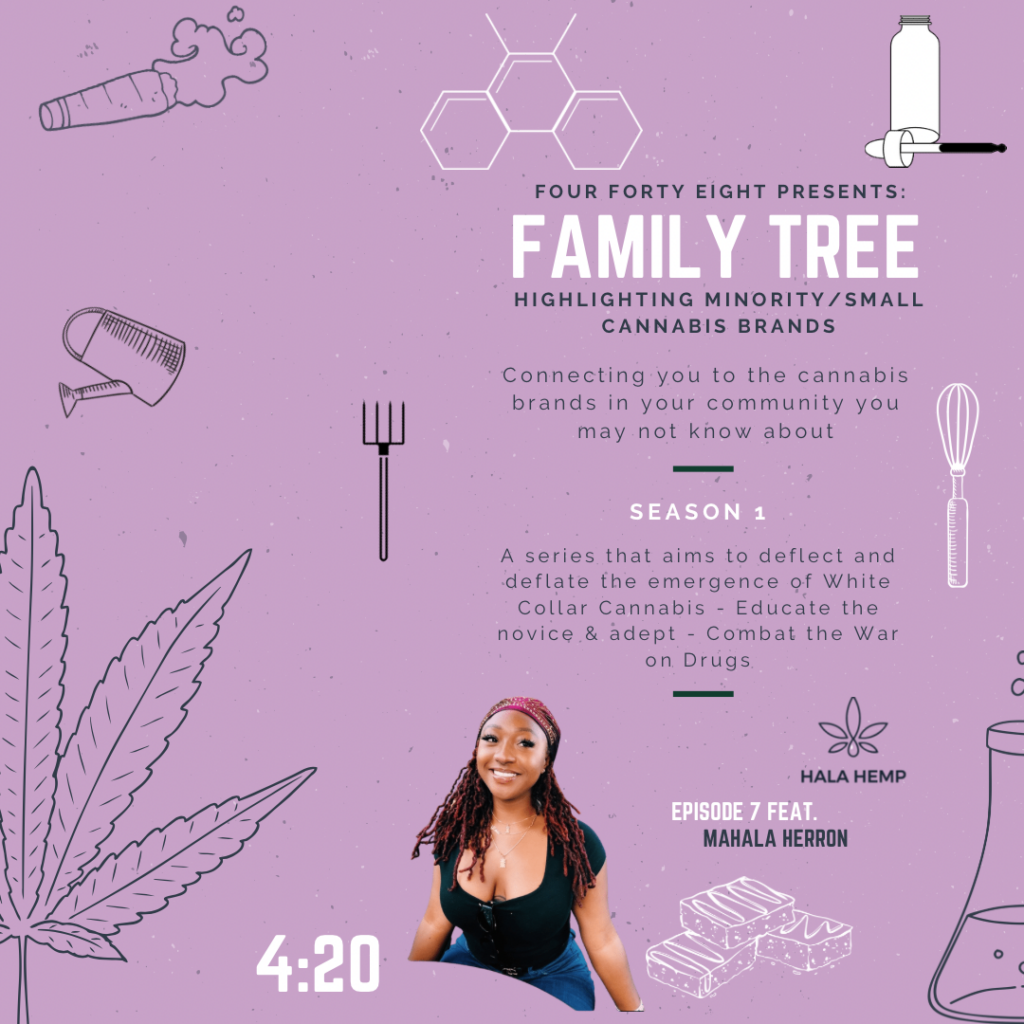

Sugar, spice, everything nice. These are the ingredients chosen to make the perfect… Well in this case, it’s African American studies and Earth & Planetary Science. These are the ingredients that make up the driving force behind Owner Mahala Herron and the direction behind her brand Haha Hemp. Focusing on setting the sustainability standard not only for the cannabis industry but across the globe. Our planet is dying and it’s up to us individually to do our part. The precedent Mahala is setting with the Hala Hemp Sustainable Project is profound. If executed correctly, this could start a ripple or domino effect. Understanding the healing relationship between cannabis and African Americans is essential to understanding the direction the industry needs to move. Mixed with Earth and Planetary Studies it shows us what this plant can really do for humanity if we practice sustainably. Mahala believes if YOU become more environmentally responsible with your cannabis and do your part, we can save the planet. Find out what she had to say!
Q: 5% of your company sales go to non-profit organizations helping liberate victims of the War On Drugs (WoD). Which is extremely noble & profound. What was the thought process behind doing so? Do you have a personal connection to this cause?
A: I wouldn’t say it’s profound, if anything I’d say I’m not doing enough. But I do remember, just being from Oakland, there’s a lake in the middle called Lake Merritt and seeing people just smoke weed. I’d be riding my bike and look over and see someone sparking up. I remember turning to my mom and saying “They’re smoking!” and she’d say “it’s just weed, leave them alone” as if I was bothering them or something. Haha. My connection to the cause is just seeing and being from a place where cannabis is so much a part of the culture. I’ve gone to other places like Chicago and people would be like “Oh, watch out” or “Oh, we can’t smoke”. I wasn’t used to that and it’s unfair. So I just wanted to make sure, me entering the cannabis industry I was doing everything in my power to help bring justice and do what I can to help change what’s been done.
Q: When you think of CBD your first thought isn’t luxury. This was a bold move. What made you want to tackle that lane?
A: Self-care and being able to tend to your needs is a luxury. People are so busy that we neglect our bodies, we neglect our health, physical & mental. So I just wanted to bring attention to self-care as a lifestyle and treating that as a luxury. I box, and my trainer had me doing a bunch of sit-ups like V curls. I had to prop my legs a certain way and I told him it hurt. His response was “It’s luxury” and I’m like “Huh??”. So what he meant was, it’s a luxury to be able to workout harder. A lot of people don’t treat their bodies as if being able to walk isn’t a luxury. To have all of your limbs is luxury. So I just wanted to bring attention to that.
Self-care and being able to tend to your needs is a luxury. We neglect our health, physical and mental. I wanted to bring attention to self-care as A lifestyle and treating that as a luxury. People don’t treat their bodies as if being able to walk isn’t a luxury
– Mahala Herron on Health being a luxury
Q: Women don’t get enough respect or credit in the dog eat dog world of business/entrepreneurship. (Especially black women) What challenges have you faced with those two proverbial strikes against you?
A: I did a radio show for 4 years, and in that industry I definitely didn’t feel respected. I wasn’t getting respect, getting paid, I wasn’t getting the interviews I wanted. So I transitioned from that space to the cannabis space. I can genuinely say I feel like the cannabis industry is doing everything it can to be anti-racist, support women, support black people. Maybe it’s just, compared to the entertainment industry but I’m finding a lot of people such as you all, are highlighting women, black women, an just doing their part. I’m really grateful to be in an industry such as this where I can actually grow and feel like my hard work is respected. Feel like I’m making a difference and inspiring the next black girl.
Q: Tell us who Hala Hemp aims to serve within the cannabis community?
A: We want to just highlight black and brown people, period. Specifically because we experience stress, anxiety, PTSD, auto immune deficiencies. We’re being affected by these things at a higher rate than our white peers. And CBD directly speaks to these issues and helps us in those ways. Yet, CBD products aren’t marketed towards us. CBD is extremely overpriced and unaffordable for the people who need it the most. So I want to bring CBD to those people. Also a large part of Hala Hemp is sustainability. All of my products are reusable and compostable. And I just wanna help make sustainability a lifestyle for black and brown people. Show them how and that it’s inexpensive. It does take some extra work. But that just adds some extra activity to our daily lives. CBD can help with that. So I just wanted to market to those groups, period. Of course white people can purchase and participate with Hala Hemp. I support them. My white peers have been very supportive of Hala Hemp. But I want my brand to speak to people of color specifically.
Q: When attending cannabis conferences what do you feel is the most represented target market? Have you started seeing an increase in the representation of the demographic Hala Hemp serves?
A: I would say that I’ve only been to 3 conferences. The most recent one was ‘Emerge Canna’ and I was on a diversity panel. Emerge was amazing! It was a digital conference, it looked like a regular conference you’d go to. There were booths, you could create an avatar. My friend had a smoke session. Kudos to them. I’d say that specific conference made an effort to reach out to underrepresented groups. I can’t say the same for other conferences and initiatives that I’ve seen. I will give a shout-out to Rise, they’re calling people out in the cannabis industry who are anti-black and are saying things inappropriately and cashing in off of us. At this point, I think a lot of Industry leaders in the space are doing a good job of showing if you sell cannabis and are racist you are literally contradicting yourself.
Q: Where do you see Hala Hemp in 2-5 years?
A: I was just speaking in this to Voyage LA, which is like a culture magazine here in LA. I think, as long as I can make Hala Hemp a bomb philanthropic company/organization and I can serve people? Then I’m successful. In 2 years, if I can see the donations I’m giving and the work I’m doing really changing people’s lives? Then Hala Hemp is the most successful company out there. Nobody could tell me anything. But what I really see for it is really becoming a lifestyle brand like Nike. Right now wellness is so corny, and boring. It’s 30 year olds doing yoga. I think it’s lame. It’s really whack because the people who need wellness the most right now are black men, black women, our essential workers. They’re not doing yoga. That’s not the view or outlook of wellness. I just want to be able to reach those people and the best way I know how is through music. If I could merge cannabis, sustainability, and R&B/Hip-Hop. Then I feel like Hala Hemp is the dopest brand.
Q: Where do you draw inspiration from? For me, it’s music. Who do you listen to to get inspired and get your creative juices flowing?
A: Lauryn Hill, India Irie, I really like Eryka Badu of course. I love Brent Fiyaz, his music really speaks to me. My favorite female rapper is Nikki Minaj, that says everything about me. I think music is the best connecting tool. In being in radio for a few years, getting people to open up on the most vulnerable parts of themselves through music had been very rewarding for me. I know people like Kelani smokes hemp. Miley Cyrus smokes hemp. I want to use hemp as an alternative to high THC cannabis so people can see that’s not all you have to smoke. There are different strains for different settings. You can customize your smoking to your lifestyle. Maybe not smoking a high THC Indica dominant at 9 AM. Maybe smoking hemp in the morning, a little Sativa in the afternoon, or however you want to do it.
Q: What was your first interaction with cannabis and what drew you to the plant?
A: My first interaction with cannabis besides seeing people smoking as a kid. I was in the 10th grade, I remember going to a football game. And the “high” kids were hanging out and I was the type of person that could hang out with anybody. So I was moving through back and forth with the nerds & high kids. So they were like “wanna smoke?” and I had never smoked before. So they had this pipe and I used it the wrong way, they interrupted like “No! Party foul” I eventually got the hang of it and remember I got high the first time and laughed for hours! I was like “Do you think my mom will be able to tell I’m high?” They said just don’t laugh! Stop laughing.” That was a private school, so the next year I went to a public school and the kids there were smoking weed at lunch. They were always offering me weed. I had a bunch of people just assume I was a whole stoner. That was really my first experience. Then I got to college and became a super stoner. Which is funny, because now. I don’t smoke high THC that often now if at all. If I do, it’ll be like one or two hits. I’m really into hemp. I like CBD dominant cannabis. I would prefer that. But I like a good hit of Sativa from time to time.
Q: When did you see a need to enter the industry?
A: The way that my journey went was, I had a lot of internships in college and a lot of them were all of the main radio stations. So I quickly realized I didn’t want to work for anyone else, I wanted to work for myself. As I was discovering myself and seeing where my interests lied, that’s when cannabis really piqued my interest. Just not only smoking it a lot at the time, but I chose to make my health a priority and cannabis is really such a great way to blow off some steam and you can relax and not really have to do too much to gain peace of mind.
Q: Who are some people you look up to in the industry and would love to work with (collab in some fashion)?
A: I have to give a shout out to Maha. She’s a UCLA alum like myself and she’s just amazing. She’s the plug, she knows literally everyone. And she is selfless. A lot of people in the industry are stingy with their resources. Well, I’d say some people not everybody. But she’s not stingy, she hands them out. I respect her. She deserves all the praise she can get. I look up to her, I really look up to Snoop Dogg. Just when we talk about his music and what he’s done in cannabis..He’s the guy, he’s the man and I would love to work with him. I’d love to work with Wiz Khalifa, he does some of the same work. Specifically what he’s doing in music and cannabis. I really look up to Al Harrington. He’s reaching back. They just partnered with Gold Standard Farms, which is a Black-Owned hemp farm in Tennessee. Just that pioneership and mentorship. It’s something to be admired, especially amongst black people. I’d love to work with The Cannabis Cutie! She’s so informative! I watch her stuff a lot to get my information. Who else? Oh yea, I’d like to give a shoutout to Jessie Grundy with Peakz, he’s doing the thing. It’s so many people from the bay. Roddy Ricch says he had a grow house in the bay, I’d like to see about that! Anybody that’s doing stuff with music, entertainment, sports, and merging it with cannabis is someone I’d love to work with because it’s not an easy task.
Q: What will it take for the black community to begin thriving as providers in the cannabis industry?
A: I think everything takes money. And I think black people knowing our buying power like knowing our true buying power. If we never stepped into another dispensary again the cannabis industry would be down bad. Now if we all went back to our neighborhood weed man and circulated the money amongst ourselves? The cannabis industry would be hurting. That’s where knowing our power comes in and the ones of us in the industry give out the resources to who needs them. That’s what it’d take for us to thrive in the industry. Money & Knowledge.

